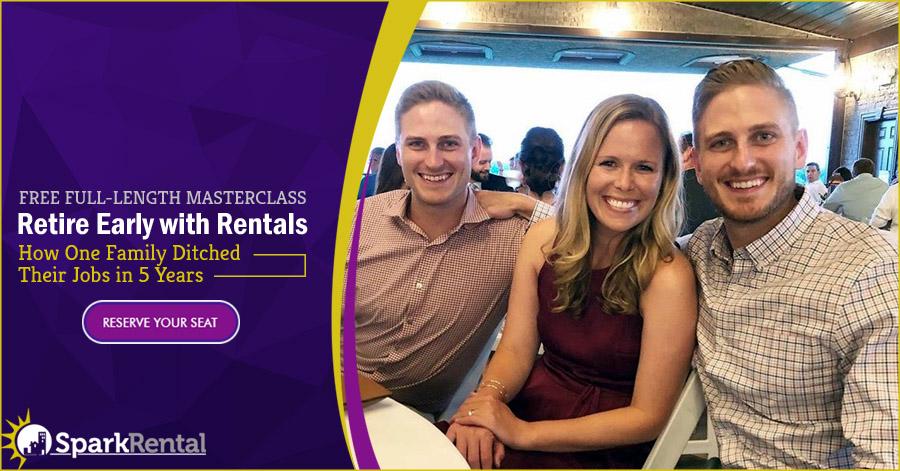
At first I was afraid. I was petrified.
That was me at 23, when it came to real estate investing. I was interested in it, and saw everyone around me achieving success with it. But I waited on the sidelines.
By 25, I was still clueless, but now I was cocky, because I thought I knew a thing or two. If there’s anything worse than being paralyzed by your fear and unwilling to act, it’s rushing off the cliff without the parachute of knowledge.
I proceeded to start aggressively buying up properties. I overpaid and then overpaid some more. I didn’t understand how to calculate a rental property’s cash flow properly. And budgeting for CapEx? I’d never even heard of it.
I had no formal training, no coach, no mentor. I learned by trial and error (lots and lots of error). But the good news is anyone can succeed in real estate – if I did it with no training, you can do it with guidance!
Real estate investing remains an excellent way for anyone, not just the rich or impeccably educated, to become wealthy. It requires discipline and finding people to help educate you, neither of which require a Ph.D. or a trust fund.
Here’s what I wish I’d known starting out, that would have saved me hundreds of thousands of dollars in grief.
1. How to Calculate & Forecast Cash Flow Accurately
If you do this right, you’ll never lose money on a rental property.
If you get cash flow calculations wrong, you’ll end up buying bad investments. You will lose money.
You earn your profit from two things: choosing good investment properties and then managing them effectively. Both need to be present for you to earn money. I’ve lost money from buying a bad investment, even though I later managed it well. I’ve also lost money buying a good investment, because I hired a terrible property manager who mismanaged the property to the tune of $30,000 in losses.
But it starts with evaluating potential properties, and forecasting their cash flow.
New investors get cash flow calculations wrong because they think in terms of “What will the property earn me in a normal month?” But that’s not how rentals work; in a normal month, your cash flow will probably look just fine. And then you’ll get a $2,000 roof repair bill. Or the renter will stop paying and you’ll have six months of unpaid rent while you go through the long, tedious eviction process.
You must include less visible, irregular costs in your cash flow calculations. Vacancy rate. Repairs and maintenance. CapEx. Property management fees (even if you’re managing it yourself!). Accounting, bookkeeping and administrative costs. Use a free rental property calculator to run the cash flow numbers for any property.
Rental properties’ cash flow is about averaging out irregular but inevitable costs. I didn’t get that when I was young.
2. Once You Buy a Property, Its ROI Comes from Excellent Management
We touched on this above; it’s not enough to buy a good deal, you then have to manage it for maximum returns.
While property management is a massive field of study in itself, the two most important pieces for maximizing returns are tenant screening and renter retention. In other words, getting good tenants, then keeping them for as long as possible.
The “four horsemen” that kill rental returns are rent defaults, evictions, turnovers and property damage. They can all be avoided through comprehensive tenant screening and disciplined renter retention programs.
Read up on Tenant Screening 101, and if there’s nothing else you ever learn about property management, get tenant screening and retention right.
And if you don’t have the time or temperament to manage properties yourself, don’t sweat it. You can hire a property manager. Just beware that you still have to manage the property manager, and ensure they’re doing best practices like semi-annual inspections of every rental unit, annual rent raises, and so forth.
3. House Hacking Is a Great Way to Get Started
If you don’t own any rental properties yet, consider house hacking for your first deal.
For non-real estate investing nerds, house hacking refers to buying a small multifamily property (2-4 units), moving into one unit, and having the neighboring renters pay the mortgage.
Why is this such a great strategy?
First, you can get a residential mortgage as a homeowner, for a property with up to four units. Lenders will even let you add 75% of the future rents to your income, to help you qualify for the loan. You get a low down payment, a low interest rate, and lower lending fees, as a homeowner rather than an investor.
Beyond the financing advantages, it gives you an up-close-and-personal introduction to managing rentals… and renters. You’ll get a great education from managing your first few rental units so intimately.
Multifamily properties tend to cashflow better than single-family homes, which is another perk. Read Tim’s story about how he, with no real estate investing experience, house hacked a duplex and now lives for free.
But you don’t even necessarily have to buy a multifamily in order to house hack. You can buy a single-family home, and create an income suite. Or you can just rent out the other bedrooms!
4. You Don’t Need the “Perfect Deal,” to Start Investing; You Need a Good Deal
As the saying goes, perfection is the enemy of progress.
There’s no such thing as a “perfect deal” in real estate investing. There are good deals and bad deals. A good deal will have delivered a strong return by the end of each year, even after those uncommon-but-inevitable expenses such as vacancies and repairs.
Which still might require a great deal of work to find. Good deals are out there, but that doesn’t mean they’re littering the MLS and you’ll stumble over a new one every day.
Set a target for cash-on-cash returns, based on those cash flow calculations we talked about earlier. I recommend aiming for 8-10% to start with, but that’s your decision. Commit to yourself that you will not settle for a deal that earns less than your target, and set out to find a deal that works.
Don’t be afraid to negotiate. Don’t get discouraged. Keep pressing forward until you find a good deal, and forget idealized notions you might have about finding the exact perfect property.
5. Focus on the Fundamentals, and Set the Rest Aside for Later
In support groups I hear new rental investors asking all the time about the “fancy stuff.” Questions like “I’m preparing to buy my first rental property, should I use an LLC or S-Corp, or a trust?”
There’s also a lot of talk about timing the market, or trying to find the perfect financing that gives you that extra 1% of LTV.
Forget that stuff. Or rather, put it aside for years from now. When you’re first starting out, you don’t need to worry about advanced strategies like asset protection. It’s a distraction from what’s most important.
Focus on the fundamentals: calculating cash flow. Screening tenants effectively. Attracting good applicants. Strategies for finding good deals on properties.
You don’t need an LLC for your first property. And timing the market? The best economists in the country often get it wrong when they try to predict the market. If they can’t do it, you can’t either.
What you can do is accurately forecast cash flow, so even if you buy a property and its value then drops, you’ll still earn profits from it as a rental. That’s the beauty of rentals: they keep on making money, so you can wait until whenever you’re ready to sell.
It’s among the best financial advice you can learn young: master the fundamentals of personal finance and investing, and you can’t help but start building wealth faster.
6. You Do Need a Cash Reserve, But It Doesn’t Have to Be Massive
 As a landlord, even just as a responsible adult, you do need a cash cushion.
As a landlord, even just as a responsible adult, you do need a cash cushion.
Sometimes you’ll be hit with unexpected expenses. It could be the furnace this year, and then next year the air conditioning condenser. Or your tenants could lose their job and stop paying the rent. Or you could lose your job, right at the same moment that the furnace needs replacing.
So yes, you’ll need some cash set aside. But it doesn’t need to be tens of thousands of dollars. If you can cover your own bare-bones living expenses for a couple months, and you have an extra thousand or two set aside for unexpected repairs, you’ll probably be fine.
If you really need it, you can always put some expenses on your credit card – yet another reason to keep a low (or no) balance on your credit card, so that it’s an option for emergencies.
At a certain point, there is such a thing as too much cash. Cash loses money every year to inflation, so you want to keep enough to help you sleep at night, but not so much that you’re losing out on other potential investments.
7. Avoid the Slums
There’s a difference between working-class neighborhoods and slums. If you intend to invest in cheap real estate, you need to know exactly where that line falls.
When I was in my 20s, I had this grand vision in my head, that I would turn these bad neighborhoods around. What happened instead is these bad neighborhoods turned my wallet upside-down.
If you’re just starting out, I recommend investing at the intersection of working-class and middle-class neighborhoods. The kind of neighborhoods where people take pride in their homes and yards, even if they’re smaller. Neighborhoods where curmudgeonly old men are constantly keeping an eye out, where mothers shake brooms at ne’er-do-wells, where the community polices itself.
Take it from someone who has lost a lot of money to bad neighborhoods: leave them to niche specialists.
(article continues below)
8. Network Like Your Income Depends on It (Because It Does)
No, you don’t need to be a smooth-talking glad-hander. But you do need to constantly look for ways to meet local people who can collaborate with you in some way or another.
You need a great real estate agent, preferably one who specializes in investors.
You need a wide range of contractors, from every specialty (including low-cost handymen).
The list goes on: lenders, home inspectors, wholesalers, turnkey sellers, property managers. Real estate investing is a team sport.
And as for finding deals, remember something: it’s your network that will produce good deals for you, not your own brilliance. You’re not going to develop a magic formula, a secret algorithm that will make you the best real estate investor alive. But you can build a network that constantly helps you succeed.
9. Invest for Profits First, Tax Perks Second
Too many novice real estate investors think rental properties will magically slash their tax bill. For that matter, so do too many homeowners!
Investment properties do come with some tax advantages. You can take advantage of dozens of rental property tax deductions, all “above the line,” so you can still take the standard deduction rather than itemizing. You can even deduct the cost of the building itself and all capital improvements, with rental property depreciation. Plus, you have plenty of ways to avoid capital gains taxes on real estate.
But don’t buy a property with negative cash flow and justify it with the tax benefits. To begin with, you can’t even use rental property losses to offset your active income from your job or elsewhere — it can only offset other passive income. And even if you could, negative cash flow means you have a liability, not an asset.
Buy rental properties for cash flow and passive income. Hopefully they’ll also appreciate, but as you should know by now, real estate doesn’t always go up in value. Don’t buy counting on future appreciation, and don’t buy primarily for the tax benefits.
10. If You Don’t Have Much Money or Experience, Partner Up
Few real estate investors have $50,000 just sitting around when they first start investing. And beginners certainly don’t have the experience and skills needed to reliably earn strong returns (or even positive returns).
Don’t reinvent the wheel. Just partner with an investor with more experience and money than you have.
Swallow your pride, and learn how to avoid common real estate investing and property management mistakes. You’ll save yourself a world of pain.
11. Only Invest in Investor-Friendly Markets
Novice real estate investors often fail to look beyond their home city. But large, coastal cities tend to make terrible markets for real estate investing.
To begin with, the cap rates and gross rent multipliers (GRMs) are terrible for rental properties. In other words, the ratio of rents to prices is too low.
Along similar lines, there’s just too much competition. You have too many investors tripping over each other to invest in limited housing supply.
Worst of all, the laws in major cities tend to tilt heavily in favor of tenants. These markets end up with distorted anti-landlord laws that come with too many hassles, fees, red tape, and risks for investors.
Find investor-friendly markets, with better fundamentals and regulation both. Start with this breakdown of the top cities in the US for rental properties by GRM.
Transcending “Fear and Greed”
People talk about fear and greed being the two opposing forces that guide all investments and market movement. Neither is the right state of mind for success in real estate though.
I gave up several good years of real estate investing because I was afraid. Later, I bought deals I shouldn’t have because I was greedy and cocky.
Approach real estate investing as a calculated risk, because that’s exactly what it is. It’s an investment of work up front, to earn ongoing profits and passive income indefinitely. But it still takes work up front.
Real estate investing is not a get-rich-quick scheme. It’s a get-rich-slowly-after-work-and-diligence plan.
There are no free lunches in life, but there are predictable ways to gradually build wealth. I wish I’d known the above when I was younger, because it would have saved me a lot stress, grief and money along the way.
What lessons have changed your life as a real estate investor? Or if you haven’t yet bought any properties, what do you see as your biggest challenges?
























Great article! This is the kind of article that makes me feel like I can succeed even though I don’t have much experience yet.
Good! And we’re an email away if you ever want to reach out!
This is really, really helpful. I realize each item was just a small blurb, but it gives me a good “curriculum” as a new real estate investor. Reads like an 80/20 guide! Thanks guys
Any time Deana! What we’re here for 😉
Thanks for this article! I am in the process of purchasing my first rental, and I definitely have fear and doubt. You answered a lot of the questions that I have been struggling with!
Glad to hear we were able to help Tanya! Feel free to reach out any time, even if it’s just for a little moral support 🙂
Great article! Wife and I are currently planning on finding our first rental in the next couple months. Found your site through BiggerPockets, keep up the good work (and content)!
Thanks Patrick, much appreciated! Please don’t hesitate to reach out to Denise or myself directly if there’s anything we can do to help as you work on your first rental.
These are some great tips! I love finding articles that inspire people to invest in real estate rather than scare them away. Thanks for sharing!
Thanks Courtney!
Loved this article! Speaking on your advice of “Avoid the Slums.” What if you know it is an up and coming neighborhood? You see the gentrification all around, would you then reconsider? It is risky for sure but could end up becoming a great investment.
Thanks Tom!
As for avoiding the slums, it depends on many factors, including your risk tolerance. When you calculate cash flow, budget extra money for damage to the property, and for vacancy rate, because you’ll have higher turnovers, higher maintenance and repair costs, and higher vacancies than you think.
Most of all, make sure the numbers work even if the neighborhood doesn’t improve. Gentrification can reverse course – I’ve seen it firsthand.
At least it’s not too late to know all of this information now!
Very true Ned!
Thanks for this article! I was able to identify what are the steps and guide that can be use for investing in Real Estate!
Glad to hear it was useful for you Hank!
Great article, thanks! Not so sure if I agree with ignoring the asset protection remark though. Lots of things can happen and potentially crush you financially, especially when starting out.
I hear you Martin!
Thanks for the enlightenment! This would help me become a better investor.
Glad the ideas were useful for you Allan!
Networking is so important be it real estate or any other business! Thats how you progress in your life!
Agreed Tatinia!